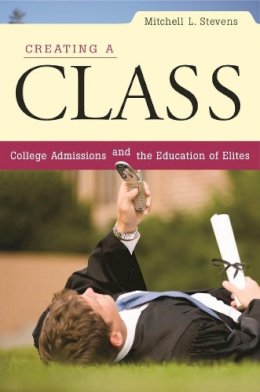
Creating a Class: College Admissions and the Education of Elites
Mitchell L. Stevens
In real life, Mitchell Stevens is a professor in bustling New York. But for a year and a half, he worked in the admissions office of a bucolic New England college that is known for its high academic standards, beautiful campus, and social conscience. Ambitious high schoolers and savvy guidance counselors know that admission here is highly competitive. But creating classes, Stevens finds, is a lot more complicated than most people imagine.
Admissions officers love students but they work for the good of the school. They must bring each class in "on budget," burnish the statistics so crucial to institutional prestige, and take care of their colleagues in the athletic department and the development office. Stevens shows that the job cannot be done without "systematic preferencing," and racial affirmative action is the least of it. Kids have an edge if their parents can pay full tuition, if they attend high schools with exotic zip codes, if they are athletes--especially football players--and even if they are popular.
With novelistic flair, sensitivity to history, and a keen eye for telling detail, Stevens explains how elite colleges and universities have assumed their central role in the production of the nation's most privileged classes. Creating a Class makes clear that, for better or worse, these schools now define the standards of youthful accomplishment in American culture more generally.
Product Details
About Mitchell L. Stevens
Reviews for Creating a Class: College Admissions and the Education of Elites
Howard Gardner, Hobbs Professor of Cognition and Education, Harvard University At the most influential American colleges, growing competition to be selective and to be selected is undermining the democratic values traditionally entrusted to higher education. Rather than serving as routes to social mobility, many college admission offices end up perpetuating the status quo. Mitchell Stevens's thoughtful and eloquent book illuminates the machinations of the system
and its consequences.
Lloyd Thacker, President, Education Conservancy and editor of College Unranked This fascinating book uses fly-on-the-wall reporting to show how decision-makers at a prestigious liberal arts college unwittingly perpetuate an American elite. Mitchell Stevens has done a real service by pulling back the curtain on the secretive college admissions process.
Susan Coll, author of Acceptance: A Novel Stevens is a storyteller, an ethnographer who takes readers on an 18-month journey as an admissions counselor. He skillfully paints a rich description of how admissions officers at a private, highly selective, liberal arts college make decisions, and explains why the ability to assemble strong applications is not evenly distributed across the population...Stevens states that his book is about privileged families and the organizational machinery in place to pass comfortable social positions on to their children. The book does much more...This text is a must read for undergraduate students, faculty, and parents.
A. A. Hodge
Choice
Mitchell Stevens gives a fascinating behind-the-scenes account of how prestigious colleges make [admissions] decisions and shows how what they decide has shaped the lifestyle and values of upper-middle-class America...It is his first-hand experience that makes the book such a gem
Stevens' narrative brings us into the thought-world of the admissions office itself, allowing the reader to view the process from the inside out.
Jordan Hylden
First Things
Merit may have displaced money as the primary calling card for admission to an elite college, but readers of this book may wonder if much has really changed.
Education Week
